
Journal of Advanced Computational Intelligence and Intelligent Informatics
Scope & Guideline
Exploring the Future of Intelligent Systems
Introduction
Aims and Scopes
- Computational Intelligence Techniques:
The journal covers a wide range of computational intelligence methods, including neural networks, fuzzy logic, and evolutionary algorithms, applied to solve complex real-world problems. - Intelligent Systems and Applications:
Research published in the journal often involves the development and application of intelligent systems in diverse fields such as healthcare, robotics, and education. - Data Analysis and Machine Learning:
The journal emphasizes methodologies for data analysis, including machine learning and deep learning techniques, aimed at extracting insights from large datasets. - Human-Machine Interaction:
There is a significant focus on improving human-machine interaction through intelligent systems, including robotics and assistive technologies. - Decision-Making Models:
Research often involves sophisticated decision-making models such as multi-criteria decision-making and reinforcement learning, aimed at optimizing various processes.
Trending and Emerging
- Artificial Intelligence in Healthcare:
There is a growing trend in applying AI techniques to healthcare, particularly in areas like disease diagnosis, patient monitoring, and treatment optimization. - Robotics and Automation:
Research related to robotics, especially in automation and intelligent control systems, has gained momentum, reflecting the increasing interest in autonomous systems. - Emotion Recognition and Affective Computing:
The journal has seen a rise in studies focused on emotion recognition technologies, especially using facial expressions and physiological signals, which are essential for human-computer interaction. - Sustainable and Smart Technologies:
Emerging themes include the application of computational intelligence in sustainable practices and smart technologies, addressing environmental challenges and enhancing efficiency. - Multimodal Data Fusion:
The integration of multiple data sources (e.g., audio, visual) for enhanced analysis and decision-making is increasingly prevalent, indicating a trend towards more complex data environments.
Declining or Waning
- Traditional Statistical Methods:
There has been a reduction in the publication of papers focused solely on traditional statistical methods without the integration of computational intelligence, indicating a shift towards more advanced techniques. - Basic Algorithmic Approaches:
Papers detailing basic algorithmic approaches without innovative enhancements or applications are becoming less frequent, as the focus shifts towards novel methodologies and applications. - Generalized Applications in Non-Specific Domains:
Research that applies computational intelligence in overly broad or non-specific domains is declining, with a trend towards more targeted and application-driven studies.
Similar Journals
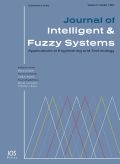
JOURNAL OF INTELLIGENT & FUZZY SYSTEMS
Bridging Theory and Application in Intelligent SystemsJOURNAL OF INTELLIGENT & FUZZY SYSTEMS is a premier publication dedicated to advancing the field of artificial intelligence, fuzzy systems, and related engineering disciplines. Published by IOS PRESS, this journal plays a vital role in disseminating innovative research and methodologies that push the boundaries of knowledge from its inception in 1993 through 2024. With an impact factor underscoring its significance, it maintains a strong reputation for quality and rigor, achieving Q3 in Artificial Intelligence and Q2 in Engineering (miscellaneous) as reported in 2023. Researchers can access invaluable insights into current trends and applications, making it an essential resource for professionals and scholars alike. The journal welcomes contributions that bridge theoretical advancements and practical implementations, fostering a community of interdisciplinary collaboration. Situated in the heart of the Netherlands, the JOURNAL OF INTELLIGENT & FUZZY SYSTEMS is committed to enhancing understanding in the realms of mathematics, statistics, and probability, with Scopus rankings reflecting its competitive edge across various fields.
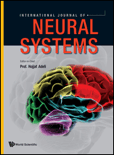
International Journal of Neural Systems
Connecting Ideas Across Computer Science and MedicineThe International Journal of Neural Systems, published by World Scientific Publishing Co Pte Ltd, is a prestigious peer-reviewed journal dedicated to the dynamic field of neural systems research. With an ISSN of 0129-0657 and an E-ISSN of 1793-6462, this journal serves as a vital resource for researchers, professionals, and students interested in the intersections of computer science, neural networks, and communications. Noteworthy for its impact, the journal has achieved impressive rankings in 2023, positioned in the Q1 quartile for both Computer Networks and Communications as well as in the miscellaneous category of Medicine, highlighting its interdisciplinary significance and broad relevance. The journal's Scopus rank places it at #33 out of 395 in its category, reflecting its influence and reach within the academic community. While the journal is not open access, its contributions to advancing the understanding of neural systems are invaluable, offering a platform for disseminating cutting-edge research and fostering collaboration among scholars. Since its inception, the International Journal of Neural Systems remains committed to excellence and innovation in its published content, making it an essential subscription for everyone involved in this exciting and rapidly evolving field.

Cognitive Computation and Systems
Advancing the Intersection of Mind and Machine.Cognitive Computation and Systems is an innovative open-access journal published by Wiley, dedicated to advancing the fields of Artificial Intelligence, Cognitive Neuroscience, and Computer Science Applications. Based in the United Kingdom, this journal has established itself as a key resource for researchers, students, and professionals alike since its inception in 2019. With a focus on the convergence of cognitive theories and computational methodologies, Cognitive Computation and Systems aims to publish high-quality research that bridges holistic cognitive processing with algorithmic design. Although the journal is currently categorized in the lower quartiles of its fields, it provides a unique platform for disseminating pioneering ideas that can drive the vital intersection of computer vision, pattern recognition, and psychology. Scholars can take advantage of its open-access model, ensuring that research findings are freely available, thus promoting wider knowledge sharing and collaboration within these rapidly evolving domains. With its ambitious scope and commitment to quality, this journal is poised to make a significant impact in its respective fields.

International Journal of Fuzzy Logic and Intelligent Systems
Leading the Charge in Computational InnovationInternational Journal of Fuzzy Logic and Intelligent Systems, ISSN: 1598-2645, is a prestigious journal published by the Korean Institute of Intelligent Systems, dedicated to advancing the fields of Artificial Intelligence, Computational Theory and Mathematics, Computer Science Applications, Logic, and Signal Processing. Established to foster interdisciplinary research, this journal has quickly established its reputation, reaching a respectable Q3 quartile ranking across multiple categories in 2023. It serves as a vital resource for researchers, professionals, and students, offering insights into cutting-edge methodologies and innovative applications of fuzzy logic and intelligent systems. With a focus on disseminating high-quality research, the journal attracts contributions that drive the evolution of intelligent technologies and their practical implications. Published from South Korea, the journal is positioned to impact the global community, facilitating a deeper understanding of intelligent systems in various domains.
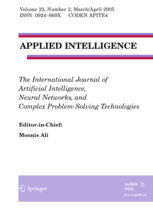
APPLIED INTELLIGENCE
Pioneering practical solutions through applied AI research.Applied Intelligence is a prominent peer-reviewed journal that has been instrumental in advancing the field of Artificial Intelligence since its inception in 1991. Published by Springer, a reputable name in academic publishing, the journal focuses on the innovative applications of intelligent systems, algorithms, and methodologies across various disciplines. With an impressive Q2 ranking in the Artificial Intelligence category for 2023, and a Scopus rank of #117 out of 350 in its field, Applied Intelligence is recognized for its significant contributions and rigorous standards. The journal is accessed primarily through subscription, ensuring that high-quality research reaches the academic community and industry professionals alike. Its commitment to disseminating cutting-edge research makes it an invaluable resource for researchers, practitioners, and students interested in the practical implications of AI advancements. Join a community dedicated to exploring the transformative power of artificial intelligence and stay ahead in this ever-evolving field!
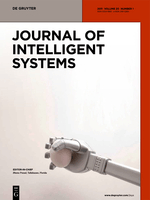
Journal of Intelligent Systems
Fostering Global Collaboration in Intelligent ResearchThe Journal of Intelligent Systems, published by DE GRUYTER POLAND SP Z O O, is a premier open access journal that has been at the forefront of advancements in the fields of Artificial Intelligence, Information Systems, and Software Engineering since its inception in 1991. With a commitment to disseminating high-quality research, the journal has been recognized in the 2023 category quartiles as Q3 in these critical areas, reflecting its relevance and impact in the academic community. The journal serves as a vital platform for researchers, professionals, and students interested in the evolving landscape of intelligent systems, offering insights into innovative methodologies and applications. As an open access publication since 2020, it ensures that research is readily available to a global audience, fostering collaboration and engagement within the scientific community. With a Scopus rank in the 65th to 69th percentiles across its categories, The Journal of Intelligent Systems continues to contribute significantly to the discourse on intelligent technologies and their implications for the future.

International Journal of Intelligent Computing and Cybernetics
Transforming Ideas into Intelligent Cybernetic ApplicationsThe International Journal of Intelligent Computing and Cybernetics, published by EMERALD GROUP PUBLISHING LTD, serves as a pivotal platform for advancing the field of intelligent computing and cybernetics since its inception in 2008. With a strong focus on innovative research and interdisciplinary collaboration, this journal is positioned in the prestigious Q2 category of Computer Science, ranking at an impressive 42nd out of 232 in Scopus, reflecting an 82nd percentile performance. The journal provides a venue for scholars and practitioners to disseminate their findings on cutting-edge technologies and methodologies that bridge the realms of computing, artificial intelligence, and cybersecurity. Although currently not an open-access journal, it widely circulates valuable insights essential for driving forward academic discourse and practical applications in the rapidly evolving digital landscape. Researchers, professionals, and students are encouraged to engage with this journal to stay at the forefront of advancements in intelligent systems and cybernetic solutions.
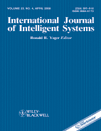
INTERNATIONAL JOURNAL OF INTELLIGENT SYSTEMS
Empowering Scholars with High-Quality Research in Intelligent SystemsInternational Journal of Intelligent Systems, published by Wiley-Hindawi, stands at the forefront of the Artificial Intelligence, Human-Computer Interaction, Software, and Theoretical Computer Science fields. With an impressive Q1 ranking across multiple categories in 2023 and a robust track record since its inception in 1986, this journal is essential for researchers, professionals, and students alike who are eager to explore cutting-edge innovations and theoretical advancements. Located in the United Kingdom, the journal operates under the esteemed Wiley-Hindawi publishing house, ensuring a broad dissemination of high-quality research articles. The journal's diverse scope encompasses advancements in intelligent systems and their practical applications, fostering an interdisciplinary dialogue that encourages collaboration across various domains. Although Open Access options are not available, subscribers benefit from the rich repository of knowledge this journal offers, making it a vital resource in the rapidly evolving landscape of intelligent technologies.
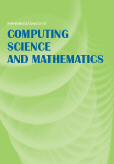
International Journal of Computing Science and Mathematics
Exploring Innovative Solutions in Computing and MathematicsThe International Journal of Computing Science and Mathematics, published by INDERSCIENCE ENTERPRISES LTD, is a pivotal platform for the dissemination of cutting-edge research in the intertwined disciplines of computing science and mathematics. With an ISSN of 1752-5055 and an E-ISSN of 1752-5063, the journal primarily serves the academic community engaged in applied mathematics, computational mathematics, theoretical computer science, and more, making significant contributions that resonate across various fields of technology and science. While the journal is currently categorized in the Q4 quartile for multiple related fields, including Applied Mathematics and Computational Theory, it continues to strive towards advancing the knowledge and practice within these areas. Spanning years from 2007 to 2010 and again from 2012 to 2024, the journal seeks to publish high-quality, peer-reviewed articles that not only address theoretical advancements but also explore practical applications of computing science in mathematical contexts, thereby fostering collaboration among researchers, professionals, and students alike. Please note that this journal is not available as Open Access, thus ensuring a curated content selection intended for dedicated research communities.

INFORMATICA
Empowering scholars with innovative methodologies and findings.INFORMATICA, ISSN: 0868-4952, E-ISSN: 1822-8844, is a prestigious academic journal published by the Institute of Mathematics and Informatics, located in the Netherlands. Established in 1990, this journal has carved a significant niche in the fields of Applied Mathematics and Information Systems, holding a commendable Q2 ranking in both categories as of 2023. With a Scopus ranking of #68 in Applied Mathematics and #123 in Information Systems, INFORMATICA boasts an impressive percentile standing, demonstrating its high impact and relevance in contemporary research. The journal promotes rigorous scholarship, disseminating innovative research findings and methodologies that contribute to the advancement of mathematical and informatics theories and practices. Although it does not currently operate as an open-access journal, it provides invaluable resources for researchers, professionals, and students looking to deepen their expertise and knowledge in these dynamic fields. With a commitment to fostering academic exchange and interdisciplinary collaboration, INFORMATICA remains an essential platform for those committed to pushing the boundaries of knowledge in mathematics and informatics.